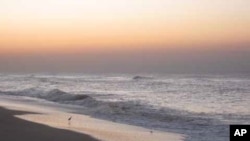The ocean is our lifeline. It produces much of our oxygen, regulates our climate, and supports the greatest abundance of life on our planet. If the ocean were to lose its capacity to provide these services, it would threaten the survival of nearly every creature and every plant.
“The ocean is fragile, the ocean is an ecosystem, and the ocean requires stewardship just like every other aspect of life on this planet. And for all its size and its majesty, and it is majestic for those who’ve spent time on the ocean, it is vulnerable,” said Secretary of State John Kerry at an event on the sidelines of the Paris Climate Conference.
“No one should underestimate how critical it is to deal with the three great problems of the ocean today,” he said.
The first of these is pollution.
“It happen[s] inadvertently, not willfully, but nevertheless, [it is] one of those byproducts of development and industrialization and agribusiness.”
So for example, nitrates in agricultural run-off cause ever-expanding dead-zones. Plastic trash carried on the currents creates problems for navigation and jeopardizes sea creatures.
The second problem is illegal, unreported, and unregulated fishing –IUU for short. Illegal fishers take too many fish. They also frequently use damaging practices and equipment, such as the destructive driftnet. Driftnets and other destructive fishing practices have been banned, but there is not enough enforcement. We must change that, said Secretary of State Kerry. And we can start by marshalling all available resources.
“We’re putting together a system of interconnectedness on a global law enforcement and military basis, linking also with satellites, with NASA and others, in order to try to put together a regulatory mechanism.”
A third problem, ocean acidification, caused by increased concentrations of carbon dioxide in the atmosphere, kills coral reefs and destroys habitat fish need for spawning. An estimated 30 to 40 percent of the carbon dioxide from human activity released into the atmosphere dissolves into oceans, rivers and lakes. For our part, the United States aims to designate for protection 10 percent of ocean and coastal areas. We are also working to conserve important coastal ecosystems--areas such as mangroves and salt marshes that serve as sinks to absorb carbon dioxide.
Working together, the international community must ensure that agricultural and fishing practices are made sustainable, and shape our energy policies to address climate change and acidification, said Secretary of State Kerry.
The ocean is key to life itself. We can’t live without it. Together, we must protect it.

















